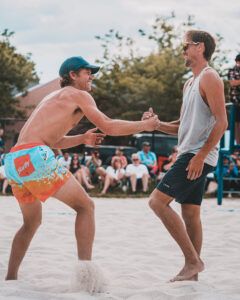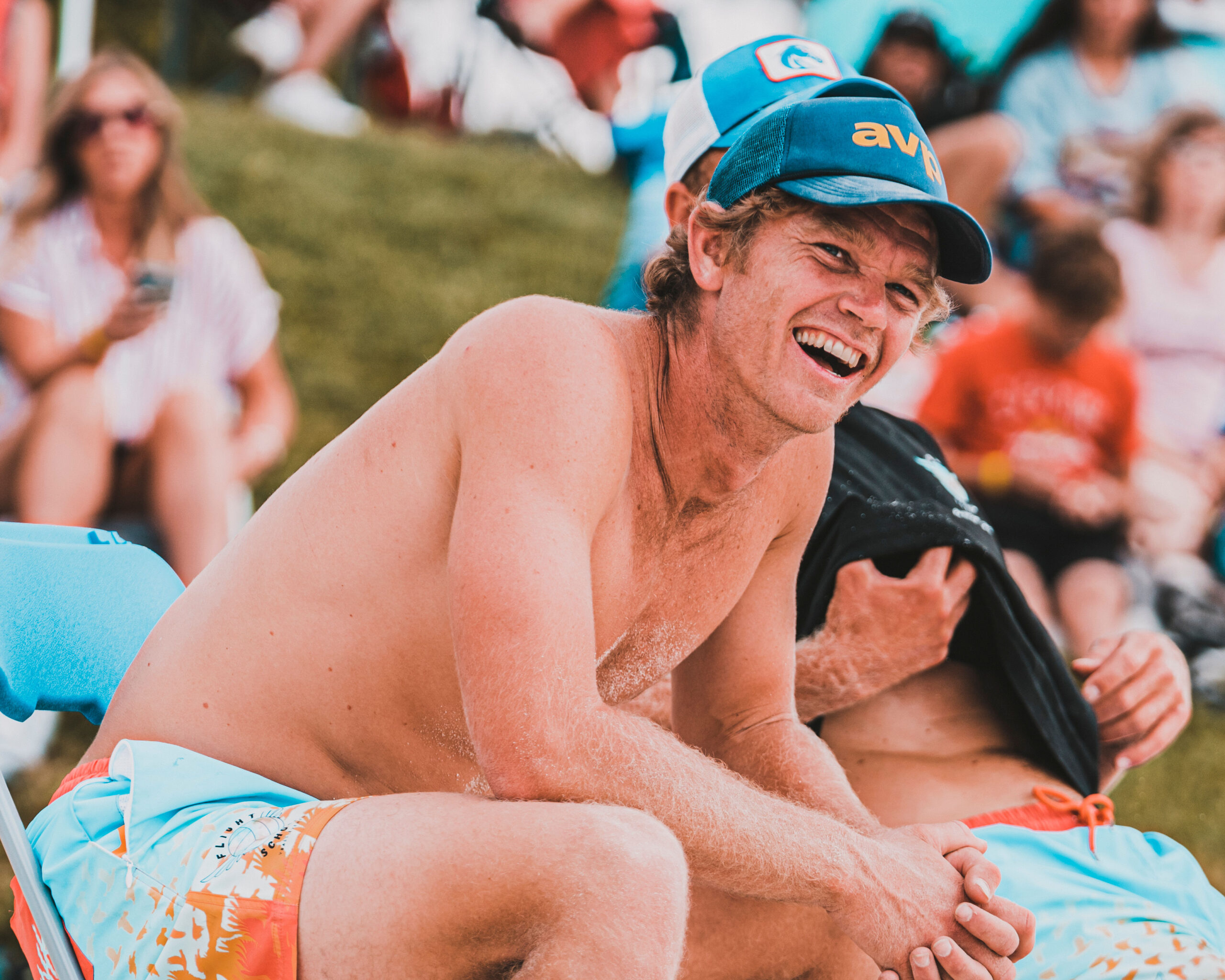SANDCAST Mailbag: Are Tri and Chaim out of the Olympic race? New AVP partnerships?
May 8, 2024
July 19, 2023
MISSOULA, Montana — To ask Chase Frishman to explain what, exactly, his vision for life is at the moment is roughly the equivalent of asking him to hold smoke or grip water.
He has a concept, an idea, and he’s getting closer. He knows it, feels it. With the advent of his Flight School, a traveling beach volleyball camp and clinic series, where he hires two, three, sometimes four professionals to teach their craft around the country — and, this past weekend, Canada — he is nearing the mold of the Japanese concept of Ikigai. It sits at the convergence of doing something he loves, something he’s good at, something the world — a small world, but a world nonetheless — needs, and something he can be paid to do.
How he found his Ikigai has been, as it has gone with much of Frishman’s adult life, a winding and weird and wonderful journey. Flight School wasn’t an idea in 2020. Not much was, as COVID shut down the country, the AVP’s schedule was yet to be determined, and Frishman, who first turned professional in 2016 after a brief stint indoors in Switzerland, had little to no prospects of what to do for work or, in a more general and terrifying sense, life in general.
It wasn’t panic, necessarily, that set in when, in the summer of 2020, he packed up his belongings into his Subaru Outback and hit the road. With nothing else to do, he just figured why the hell not? He had no set return date and only a rough itinerary.
“The trip started out kind of as ‘Screw this, I’m not sitting inside anymore just waiting for my bank account to completely empty. Is the AVP going to give us a call?’ The uncertainty was killing me,” he said then. “That’s when [Eric] Zaun kicks in, and his inspiration of the way he lived his life: ‘Hey, you don’t have to do it this way, there are other ways to go against the grain, there are other styles.’ ”
His first stop wasn’t far, a quick trip to Phoenix where he had set up a clinic at Stealth Beach Volleyball. He didn’t know it then, but Frishman had just stumbled upon his first inkling of Ikigai. Here he could teach his craft — something at which he is exceptional — help others to become better defenders or passers or side out players or whatever it may be, perhaps just an improvement in the mind-body-spirit connection Frishman seeks, and, should he continue to run clinics around the USA outside of Phoenix, make a living doing it.
“I realized how much value the pros have across the country and how much people really appreciate learning and watch the game in all these little pockets,” he said on SANDCAST: Beach Volleyball with Tri Bourne and Travis Mewhirter. “I reached out a little bit out of desperation and that turned into an excitement of how special this sport is nationwide and how many pockets and personalities and communities there are out there.
“It started as an individual journey and then I was like ‘Wait, how cool would it be if we all banded together on this? What’s better than me? Taylor Crabb!’ Then five other people banded together — I can learn from lefty Trav, how to jump over the net like Troy Field. It’s all very connected and special in that way. It’s a fun spot for me to be a part of that energy and guide this ship in a way that we don’t lose that community as it goes.”
Now?
Frishman is running more than 20 Flight School clinics per year, in pockets in the United States few could have predicted would have rich and untapped beach volleyball communities. Idaho? Montana? Indiana? Ohio? Through Frishman, those communities, and dozens of others, have now been host to clinics and half a dozen professionals. In Boise, he hauled in Troy Field, Taylor Crabb, Toni Rodriguez, and me, for three days of play and clinics.
On Saturday evening, Idaho Beach and Flight School put on an exhibition match featuring Frishman and I playing against Field and Crabb. They sold somewhere in the realm of 400 tickets at $10 a pop, creating a lively, wholesome atmosphere that was both emotionally and financially rewarding for all.
“Flight School gives me an opportunity to give a little bit more to the sport that feels more collaborative than competitive,” Frishman said. “The collaboration of the sport, I appreciate it.”

Through Flight School, Frishman is able to grow the game he loves around the country while paying the very players against whom he competes. This year alone, he has competed against Flight School coaches in four matches (not including the exhibition). It hasn’t had a negative impact on his results. Just the opposite, really: In four events on the AVP, he has finished third twice, in Miami and New Orleans, and won a NORCECA in Mexico. To compete well but continue to collaborate and build relationships is all a part of the formula for Frishman to reach that higher purpose, that Ikigai.
Frishman knows that, talented as he may be, he can learn a thing or two from Taylor Crabb, or Zana Muno, or Field or Deahna Kraft or Andy Benesh or whoever else he brings along on the ride. He knows that his way of passing might not necessarily be the only, or even best, way of doing so. That maybe Muno’s cues will be the right ones for some of the students and Crabb’s the perfect drills for a handful.
“For me it’s always like, ‘Who is going to tell somebody, this is exactly how you’re supposed to play?’ I’ve always had that open mind to it, that’s why having that panel of pros around us where I’m going to share my insight, that might look a little bit different than this person, it makes it a cool process of who do I relate to?” Frishman said. “Then they can build that relationship and it can last longer than the 8-, 10-, 12-hour day.
“The pros have made it in some way so to go across the country and connect with these kids who have a ton of talent but are hidden away in Montana or Pennsylvania somewhere where they don’t have a ton of resources, potentially, and if we can go and sparkle a bit of magic on them once or twice a year as we’re going about these dreams and say it’s possible, it’s just cool to be able to feel that energy that I matter, I mean something to these people.
“We want the personality of the pros to drip through each skill. All of us know something but I want them to teach what feels palpably rich, they feel like this is what makes them that player.”

Frishman laughed a bit when he began talking about the five- and 10-year plans he’s imagining for Flight School. Here was a business, a lifestyle, that began with serendipity discovered on a journey while living out of a Subaru Outback. And now he’s thinking a decade into the future? He’s big on flow, Frishman. Not keen on forcing things that ought not be forced. So he’ll keep running clinics, uncovering the gems in this sport, finding the flow, his Ikigai, as he goes.
“A balance of life, I always search for that,” he said. “I want to get that balance back where I work hard but also be smart in how I move forward.”
